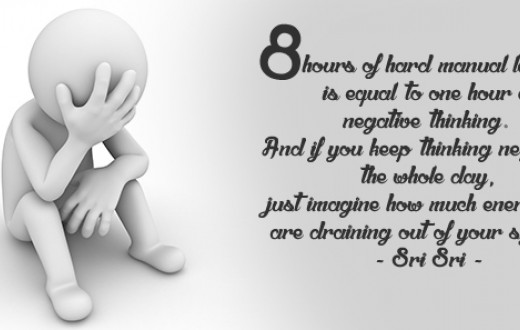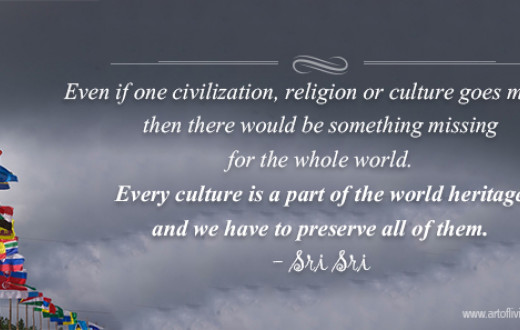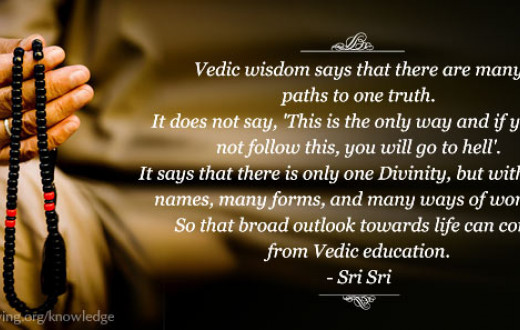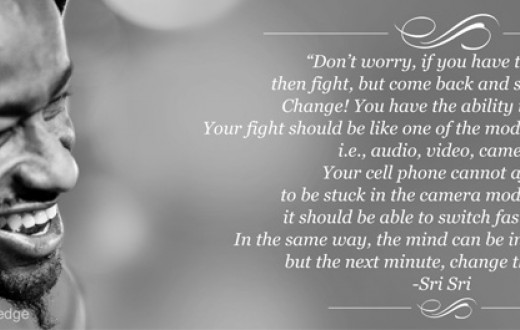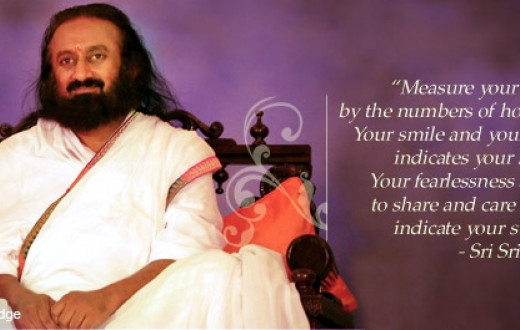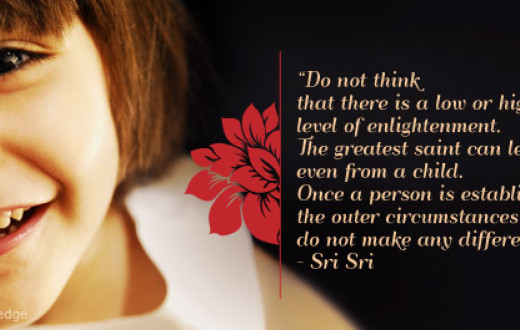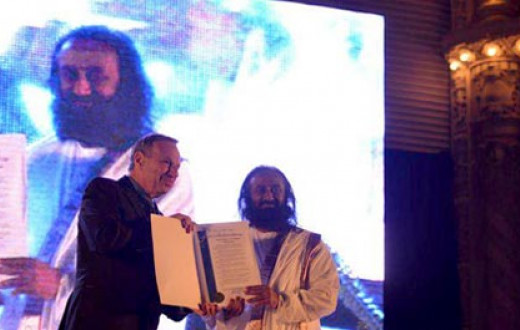, 2009:
A Special advance course with 730 participants from all over Karnataka were in Satsang with a few hundred yuvacharyas (youth leaders) from rural Maharashtra and 280 Sri-Sri-yoga-teachers-to-be. Kannada and Hindi were the prevailing languages that were understood in mutual exclusivity!
A beautiful Kannada song with deep wisdom is sung in satsang. Guruji speaks on some of the verses of this song. He then says:
Music is not to be understood. It is to be enjoyed. So listen to the whole talk like music if you don’t understand (what is being said).
For all the youth from Maharashtra, I will speak a few words in Hindi. You all have done very good work.
In life, we like some things and not others. Likes and dislikes arise only when we know a little about it (the object of like/dislike). If we don’t know, then no craving or aversion can arise.
Moha (attachment), Raaga (craving) and desires arise only towards what we know. Disgust and hatred also arise only towards what we know.
In this world how much do we know? When compared to the size of this creation, what we know is less than the size of a mustard seed. Even in that, we like only a few things, and are caught up in them.
So now, let us discuss about the things we don’t know about- the unknown.
H.H Gurudev Sri Sri Ravi Shankar: How many times have you taken birth?
Audience: I don’t know
H.H Gurudev Sri Sri Ravi Shankar: How many times will you be born again?
Audience: I don’t know
H.H Gurudev Sri Sri Ravi Shankar: How many planets like the earth exist in this universe?
Audience: I don’t know
H.H Gurudev Sri Sri Ravi Shankar: How many stars are there in the universe?
Audience: I don’t know!!
H.H Gurudev Sri Sri Ravi Shankar: How many living beings are there on this planet?
Audience: I don’t know!
H.H Gurudev Sri Sri Ravi Shankar: How many atoms are there in every breath you take?
Audience: I don’t know!
H.H Gurudev Sri Sri Ravi Shankar: How many atoms are there in a handful of this earth?
Audience: I don’t know!
We know nothing! (audience laughs)
Do you see how we are rejoicing in what we don’t know? In English, there is a proverb that says, “Ignorance is bliss”.
We know of one earth. They say there are 14 such worlds but we don’t know anything about them.
Love towards what we don’t know is called Shraddha or faith.
Do we know God? Does a child try to know the mother? It just loves her and has faith in her. Does it check which school she went to or what degree she achieved? The child does not even know the name of his mother till three to four years.
You are the child of this creation. You don’t know anything about Her. Yet you can have faith.
Sharanu Viswatmadali Mankutimma...(the first line of the Kannada bhajan)
Viswatma - vishwa is the world, atma is the consciousness. Viswatama is the universal consciousness. Do you know about your life? You don’t even know who you are? You don’t know about your sleep or dreams - why do dreams come? We don’t know!!!
Arrogance comes when you think you know something. You can be Nirahankari (free from arrogance) when your mind becomes calm and you realize that you know nothing.
When you go to the temple, you don’t know what the priest does or chants but you have faith that something good will happen. In the villages, the people have so much faith. You take the medicine from the doctor but you do not know how it works.
If you try to know how your food is digested, you will be surprised (devare)! How much work is required to just digest the food! From putting it into your mouth to chewing it, the saliva mixing in it, swallowing, then the food travels all the way to the stomach, the digestive fires and enzymes working on it, moving further into the large intestine for assimilation and so on. So much is happening!! All we know is to put the food in the mouth. After that we don’t know what happens.
There is the significance of what we know, but the significance of what we don’t know is much more.
It is just not possible to know everything about this entire creation. There is a story in the Puranas (ancient Indian epics). Brahma (the creator) and Vishnu (the protector) wanted to know about Shiva (the transformational energy). Shiva is the eternal principle without beginning or end. So Brahma begins the journey in search of Shiva’s head and Vishnu towards the feet. They go on for ages but find no beginning nor end. They decide to turn back. On his way back, Brahma sees a ketki flower falling and asks the flower where it is coming from. The flower replies that it was a decoration for Shiva’s head. Taking the flower’s words for the truth, Brahma assumes that he has seen Shiva’s head and tells Vishnu the same. Vishnu however says that he could not find Shiva’s feet.
This universe is Ananta vistara, of infinite expanse. The consciousness pervading this infinite universe is also infinite and is agneya – not knowable. It is only lovable.
Don’t wait to know the Divine. Just love the Divine who is not knowable. That is Shraddha.
When you meditate and you hear other people have such good experiences, you start thinking, “What about me?” Don’t get into this. Know that the Divine is not knowable. So sit knowing, “I don’t know anything”. This is the seed for meditation “I know nothing”.
Don’t use this knowledge wrongly. If someone asks you where you are coming from or where you are going or what is the time, don’t say “I don’t know!”. That is not right. Use this when you sit for meditation.
If we are caught up in craving or aversion then life becomes limited. There is no joy in limitedness.
Nalpe sukamasti - no joy in small things
Yovai bhooma sukam - joy is in expansion, in vastness.
When you are joyful, your consciousness expands and when you are in pain or sadness, your consciousness contracts.
Vrutti tan mayavahudu mankutimma.... (second line of the Kannada bhajan)
To sing this line, the poet has experienced the dissolution of the vruttis (distortions of the mind) in the Divine consciousness. In craving and aversion, in knowing, there is vrutti. Vrutti dissolves in the Vishwatma. The mind becomes calm and centered when you are in the space of the unknowable. You can’t have thoughts about that which you don’t know. So acceptance happens at the level of feelings.
To think, you need to know a little about it. Nirvichara (thoughtlessness) is seed for Self realization.
Shraddha or faith should not be blind. That is why we do Sadhana (Self – effort). Analysis and logical thinking are required for our day-today interactions. But they are not the raw materials for meditation.
Nada and Veda are both required. Vedas are the ancient wisdom. Nada is music that transcends knowing. Shraddha transcends both. It is the space of a silent consciousness.
Normally when we don’t know something or we don’t have the information, we get irritated or angry. But this ‘I don’t know’ is very beautiful. When this ‘I don’t know’ arises, the mind becomes peaceful and calm. This is the space for dhyana (meditation) and mauna (silence) is the way for it.
Anger - we know that getting angry is not good for us but still we get angry.
Lust - we know it is not good but still the mind races.
Greed - we know according to the law it is wrong but still your greed increases.
Dishonesty - you know it is not good to speak lies but still you do so.
Anger comes only out of weakness. Yet you see now, after practising meditation and pranayama, it reduces. When you are constantly in knowledge your anger reduces. Behind anger, there is a desire. Anger arises whether your desire is fulfilled or not.
Desires are of two types - from the level of the body and the level of the mind.
At the body level, desires are influenced by the chemical responses in your body due to your food, water, environment, your age and the company you keep.
And at the level of the mind, past impressions influence the desires that arise. Only meditation and pranayama can bring a transformation in this.
Even well-educated people have made mistakes. It is ok. Whatever happened in the past, it is ok. Just drop it. In the present moment you are innocent.
One who is caught in self blame will repeat the same mistakes over and over again. So for this, you should listen to the Bhakti sutras. Surrender your mistakes to the Divine. Just with devotion you can calm down thousands of your desires.
Desires have no end. There are people who spend their lives earning money to simply have more money than somebody else. People keep on buying clothes, shoes, sometimes more than they can ever use. There is no satisfaction
Only through Seva (service) you can experience true satisfaction and joy. And that joy will reduce your desires. Greed has no end. It is ok to have desires. There is no harm. But you must be happy. Your happiness should not depend upon any desire being fulfilled.
One should have a calm and centered disposition, have awareness and live by the yamas and niyamas (the guiding principles for life). Integrate them in your life as much as it is possible. Don’t overdo anything. It is said ‘ahimsa paramodharma’ - Non-violence is the highest dharma. When you speak many germs die, some people always keep their mouths covered because of that. No need to go so far. The more you practise the yamas and niyamas, that much more you will shine. Your interest and pull in life should be towards these principles.
Violence starts in the mind. The root cause for violence is craving and aversion. Craving and aversion can be finished in the mind itself.
What happens at the body level without your knowledge, as Lord Krishna says in the Bhagvad Gita to Arjuna, “Know that you can neither kill any being nor give life.”
You know, the Bhagwad Gita is one of the most ideal scriptures. Even Einstein had said this. Integrate this Knowledge in your life such that your life itself becomes knowledge. And this can happen only through meditation. Only through meditation can true knowledge dawn within you. And then you see the world in new dimensions.
If you feel the restlessness and longing, then you are blessed and fortunate. Your inward journey has begun. Do Seva Sadhana and Satsang. They will free you from restlessness and soak you in the fountain of love.





















